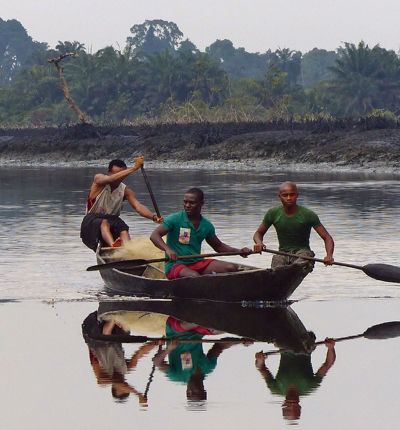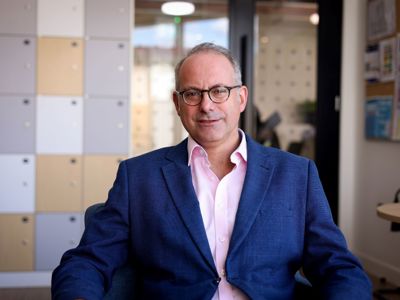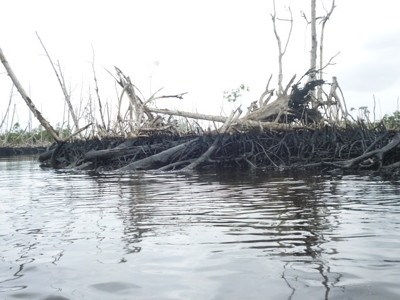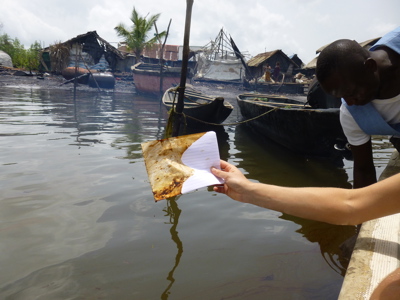
Oil company on trial over Nigerian community’s claims of inadequate clean-up of Shell’s huge oil spills which could cost nearly half a billion pounds to rectify
Oil company Renaissance, to which Shell recently sold all its onshore Nigerian operations, will stand trial at the High Court in London from 10.30am Thursday 8 May to Wednesday 21 May 2025 over claims it has failed to adequately clean-up two huge oil spills in 2008 in the Niger Delta. The Bodo community say the trial is their final chance to stop the devastation Shell’s pollution has caused to their environment impacting their way of life for generations to come.
Posted on 08 May 2025
The oil spills, which total an estimated 600,000 barrels, by Shell’s then-Nigerian subsidiary SPDC were each left uncontained for two and a half months and it is alleged that despite knowing of the spills Shell continued to pump oil through the pipeline through this period. This resulted in the largest ever loss of mangrove habitat due to oil pollution. In 2014, Shell admitted liability for the spills and agreed to a clean-up operation as part of a £55m settlement with the Bodo community.
The trial will consider claims by the Bodo community that the clean-up, which is still incomplete after 17 years, has been slow and ineffective. Experts giving evidence for the community estimate that only 7% of the oil has been removed from the ground and say significant contamination remains, posing a serious public health risk to more than 30,000 people in the area. The community is seeking a new clean-up to fully remediate the harm caused to their environment. It’s estimated that such an operation could cost Renaissance nearly half a billion pounds ($600,000,000 USD).
After raising concerns over the quality of the clean-up in 2023, the Bodo community repeatedly asked Shell to meet to discuss what clean-up is required and requested an independent expert review. Shell refused an independent review to address these concerns, so the community was forced to commission its own independent review and bring the case to trial.
Shell says the clean-up operation, the largest of its kind in the world, is almost complete and has been a success. However, the trial will hear evidence from renowned environmental experts for the Bodo community which suggests Shell’s pollution testing is unreliable and that significant oil contamination is still present. This has been revealed by the community’s independent testing in internationally accredited laboratories. The community will also argue that Shell's clean-up methodology does not meet international standards and has left dangerous levels of pollution in the environment.
The Bodo community’s legal claim is being brought against Renaissance Africa Energy Company Limited (RAEC), which was formed after Shell divested (or sold) its Nigerian subsidiary Shell Petroleum Development Company of Nigeria Limited (SPDC) in March 2025. The Bodo community has expressed concern that Shell’s sale of SPDC to Renaissance could affect the oil giant’s ability or willingness to fulfil the terms of any judgment against it, including in relation to the orders to clean up and remediate the polluted areas. Concerns have also been raised more widely over whether Shell’s sell-off of its oil production infrastructure in Nigeria indicates it is seeking to walk away from its legacy of environmental pollution without cleaning it up.
The Bodo community is represented in the trial by the Leigh Day international team led by partner Daniel Leader and solicitor Stephen Bilko who have instructed Jeremy Hyam KC, Joanna Buckley, Emma Foubister, and Hayley Webster.
Chief Polycarp Gbaraba, Chairman of the Council of Chiefs of Bodo said:
“We cannot understand how one of the world’s richest companies can destroy the environment of our community and is now seemingly trying to walk away without properly cleaning up. These huge oil spills have totally destroyed our environment and ruined our livelihoods. Shell admitted responsibility for the pollution in 2014. Yet, more than a decade later, we are still having to fight to get the oil companies responsible to carry out a thorough clean-up. It is not too much to ask that our environment should be restored and that we can live without fear of illness caused by Shell’s oil. We trust that we will finally get justice from the English courts.”
Leigh Day international partner Daniel Leader said:
"At the heart of this trial are two huge oil spills in 2008 which destroyed the Bodo community’s environment and put the health of around 30,000 local people at risk. Our clients will present evidence which they believe shows Shell’s clean-up has only removed 7% of the oil from the ground and that, 17 years after the spills, the operation is still incomplete.
“The Bodo community has sought find a way forward without the need to return to court but Shell has flatly refused to engage. That is why the community has had to bring this matter to trail to ensure that Shell, and the company that purchased its Nigerian operations, cannot simply walk away from the pollution they caused without cleaning it up.”
Leigh Day is also pursuing claims that Shell/Renaissance is responsible for oil pollution which has devastated the land and livelihoods of two other communities in the Niger Delta A preliminary trial to hear the claims of the Ogale and Bille communities was held at the High Court in February 2025 for which a judgement is pending.

Daniel Leader
International human rights, business human rights and corporate accountability lawyer

Shell trial over oil pollution which has devastated two Nigerian communities begins at the High Court in London
A trial of oil giant Shell over claims it is responsible for oil pollution which has devastated the land and livelihoods of two Nigerian communities begins at the High Court in London on Thursday 13 February.

High Court to decide whether Nigerian communities can access documents regarding Shell’s devastating oil pollution of their environment
Two Nigerian communities whose environment has been wrecked by oil pollution are to ask the High Court at a three-day hearing to grant them access to critical documents which they believe could reveal the extent of the involvement of Shell plc and its senior executives in years of oil spills and leaks.

